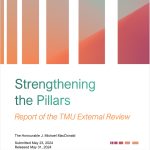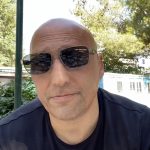Last week, while standing atop Beaufort Castle in south Lebanon, I reported on Israel’s war against Nature.
Beaufort Castle (known locally as Qal’at al-Shaqif) is a Crusader fortress in Nabatieh Governorate. In 1982, the fortress was the site of a pivotal battle between the Israeli military and the forces of the Palestinian Liberation Organization.
Metula
From the fortress, on a clear day, the Israeli settlement and military base of Metula are clearly visible. Metula is Israel’s northernmost town. It is effectively surrounded by Lebanese territory and has come under repeated attack since October 7 of last year.
Green Without Borders
At the base of Beaufort Castle lies the lush plain of Arnun. Here, a Lebanese NGO, Green without Borders (GWB), has planted thousands of trees in a campaign to reforest south Lebanon with indigenous species. Last year, however, GWB suffered a setback when the Biden administration, at the insistence of Israel, designated GWB as a terrorist organization.
The war of wildfires
While travelling through south Lebanon last week, I interviewed the region’s Director of Civil Defence. (I will be publishing that interview in the days ahead.) He explained that, during the past eight months of warfare between Israel’s military and Hezbollah’s forces, Israel has repeatedly used white phosphorous to set fire to Lebanese forests. As a result, fires are currently raging in numerous areas of south Lebanon.
On June 5 (two days after I published my YouTube report on Israel’s war against Nature), Human Rights Watch accused Israel of making “widespread” use of white phosphorous in south Lebanon and thereby endangering civilians. According to HRW:
Human Rights Watch verified the use of white phosphorus munitions by Israeli forces in at least 17 municipalities across south Lebanon since October 2023, including 5 municipalities where airburst munitions were unlawfully used over populated residential areas.
White phosphorus is a chemical substance dispersed in artillery shells, bombs, and rockets that ignites when exposed to oxygen. Its incendiary effects inflict death or cruel injuries that result in lifelong suffering. It can set homes, agricultural areas, and other civilian objects on fire. Under international humanitarian law, the use of airburst white phosphorus is unlawfully indiscriminate in populated areas and otherwise does not meet the legal requirement to take all feasible precautions to avoid civilian harm.
This past week, in what might have been a retaliatory attack by Hezbollah, a Hezbollah bombardment ignited wildfires across northern Israel. The fires have increased pressure on Israel’s government to launch all-out war against Hezbollah. After suffering a humiliating defeat to Hezbollah in 2006, Israel’s military has been loathe thus far to invade south Lebanon.
My full report from Beaufort Castle is posted below.
Hezbollah attack on Metula
In addition, as we were leaving Beaufort Castle, Hezbollah forces attacked Metula with missiles and drones. We managed to capture part of the attack on video. That video is also posted below.






[…] Dimitri Lascaris is an activist, journalist, and lawyer. Dimitri too served as Justice Critic for both the Quebec provincial Greens and the Green Party of Canada, narrowly missing leadership of the latter in 2020. He’s been traveling extensively in and reporting from West Asia for several months, most recently in Lebanon. His video reports and articles from the Middle East are available at his site, DimitriLascaris.org, where I found his recent piece, ‘Israel’s War Against Nature‘. […]